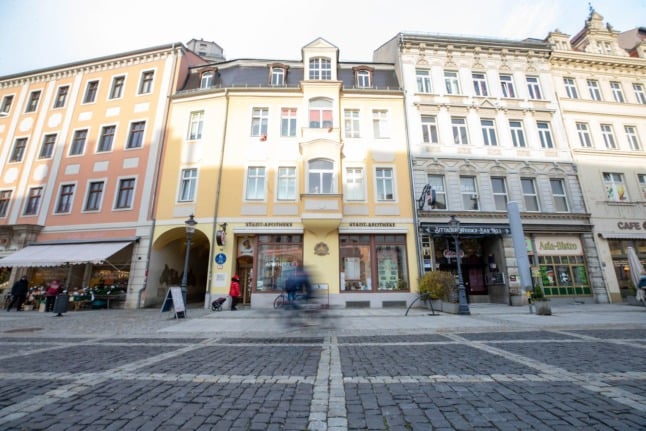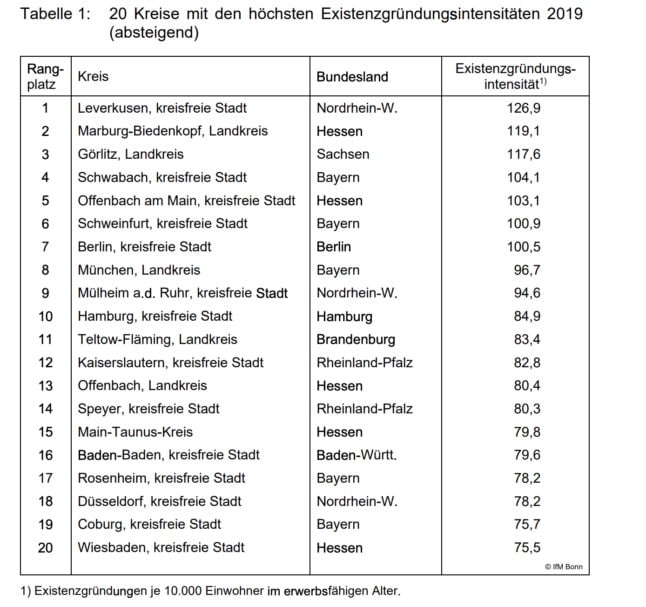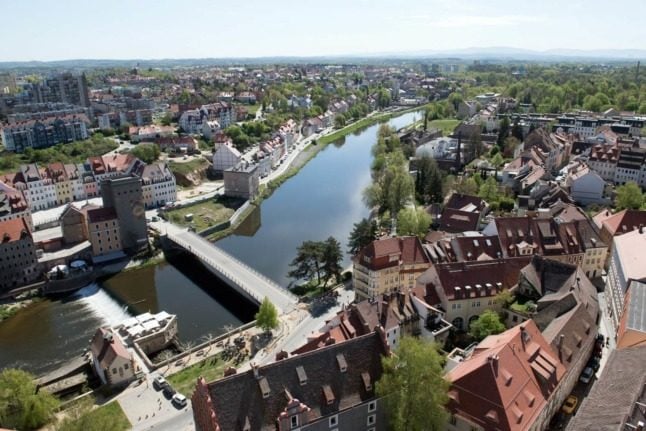When it comes to startup culture and founding new businesses, Berlin is considered Germany’s stronghold.
And although the capital undoubtedly has a thriving entrepreneurial scene, a new ranking has found that some smaller regions are ahead of Berlin when it comes to founding new businesses. However, the study also found that the number of new ventures is going down across Germany.
What does the big picture show?
The number of commercial business startups in Germany has dropped sharply. In 2003, 507,000 new businesses were logged, while in 2019 there were 266,000, the report by the Institut für Mittelstandsforschung (IfM) Bonn found.
It means that the average startup intensity has decreased from 92 start-ups per 10,000 working-age people (in 2003) to 47 (2019). The number of people starting new commercial ventures, however, varies considerably across districts.
The IfM evaluated official stats to look at the startup dynamics and the development in Germany’s 401 districts and cities. They found that the average annual rate of change in startup intensity in districts and cities has fallen by 4.3 percent.
READ ALSO: Jobs in Germany roundup – The lowdown on coding bootcamps and new quarantine rules
But a few places stood out, including the district of Görlitz in Saxony on the Polish border. It disproves the assumption that you have to be in or near a large booming city to be at the forefront of innovation.
“We were able to observe a positive trend in the annual rate of change in five regions: in the districts of Görlitz, Marburg-Biedenkopf and Teltow-Fläming as well as in the cities of Leverkusen and Mülheim an der Ruhr,” said project manager Dr Rosemarie Kay. “Overall, the start-up intensity was above the average in about 40 percent of the districts.”

Why are the number of commercial startups falling?
In general, entrepreneurship and self-employment have been dropping in Germany for years. While researchers recorded more than 500,000 startups at the beginning of the century, in 2019 – the last year before Covid-19 hit – only 266,000 people made the decision to start their own business.
“We have observed that startup activity in the commercial sector has been declining for years,” said Kay, who headed up the study and is deputy managing director of IfM Bonn.
The researchers blame a combination of factors for the general decline. One is the improvement in the situation on the German job market. Two decades ago the unemployment rate in Germany was over nine percent, and about four million Germans were looking for work.
That led to more people becoming creative and starting their own businesses. The unemployment rate now is currently around 6 percent. Today more industries are talking about a shortage of skilled workers, and are trying to recruit employees.
But age also plays a role. Older people are generally less inclined to take the risk of starting a business. The more the average age in Germany shifts upwards, the fewer startups can be expected.
The the Covid-19 pandemic has further dampened the momentum, even if there were signs of a countertrend in the first half of 2021, at least in the short term. On average, there have been four percent fewer startups every year for two decades.
READ ALSO: Booming startups draw expats to Germany
Why are new businesses booming in some parts of Germany?
In about 40 percent of the districts, the start-up intensity developed better than the national average. The number of new startups per 10,000 working age people in the district of Görlitz was 117.6. The performance of Görlitz is particularly surprising, as its average age of 49.5 years is one of the highest in the country.
However, the city on the Neisse is innovative in many respects. In 2019 and 2020, for example, people were able to find out for themselves whether Görlitz was a suitable place for them to live and work – or as a business location – under the “Testing the City” project.
“The project was primarily aimed at people who can work from any location, for example self-employed people and freelancers. They were able to use flats and work spaces free of charge for their stay,” the city said.
By contrast, the increase in startups around the metropolis of Berlin is no surprise. The capital itself is home to a large number of startups and other foundations, many of them in the service sector; industry does not play a major role here.
The table below by the IfM shows the top 20 districts and cities in Germany with the highest number of new businesses launched in 2019 per 10,000 working-age residents.

The number of commercial businesses launched in 2019 in the districts varied between around 80 in the Sonneberg district in Thuringia, which is small in terms of population to around 24,000 in Berlin.
Besides Berlin, Hamburg stands out among the frontrunners with 10,000 startups, followed at a considerable distance by the cities of Cologne (4,700), Munich (4,200), the Hanover region (3,900), and the cities of Frankfurt am Main (3,700) and Düsseldorf (3,100). The cities of Essen, Bremen, Dortmund, Stuttgart, Duisburg and the district of Munich also had more than 2,000 commercial startups.
Brandenburg benefits from Berlin
In fact, according to calculations by the German state-owned investment and development bank KfW, 181 out of every 10,000 people of working age start a self-employed business in Berlin on average each year. Out of the federal states, Berlin is in the lead. By way of comparison: in Hamburg, the second-placed federal state, there were 129. In Bremen, the third city state, there were only 41.
The dynamism in Berlin is also sweeping the surrounding area, although this may also have something to do with the fact that the capital has become too expensive for many founders. “The above-average start-up activity in Berlin has spilled over to the periphery in recent years, from which Brandenburg has benefited directly,” KfW economist Georg Metzger told German daily Welt.
Since Brandenburg has a relatively small population of only 2.5 million people, every start-up here has a high statistical weight. In the KfW ranking, Brandenburg had even risen to second place after Berlin for a while, but then fell back to fifth place during the Covid shutdown period.
Schleswig-Holstein, which is in third place with 120 startups per 10,000 working age people, likely benefits from its location near to Hamburg. Bavaria is fourth with 109 startups per 10,000 people of working age.
In principle, large cities have some locational advantages over the countryside from the point of view of startups, especially if it is not a manufacturing business.
“Startups in metropolitan areas are characterised by short distances and a high density of people and companies,” said Metzger.
Type of new business depends strongly on region
The sector in which the founders are active often depends on the respective economic structure of the region. For example, startup activity in Hamburg and Berlin is strongly fed by the media and IT sectors with their high number of freelancers.
“An industrial character, on the other hand, tends to go hand in hand with lower startup activity: large companies typically have attractive jobs to offer that are also interesting for potential founders,” said Metzger.
However, there are exceptions. A technological upheaval in the manufacturing sector, such as electromobility, can lead to jobs suddenly becoming insecure in an established industry and specialists decide to do their own thing.
For instance, the innovative champion Leverkusen is known as a chemical location; the Dax corporation Bayer, among others, has its headquarters in the North Rhine-Westphalian city. In addition, there are – often medium-sized – automotive suppliers, plastics and metal processors. Many of these business models are directly affected by the technological upheaval resulting from climate protection.

The city of 164,000 inhabitants itself advertises that “a well-networked structure of companies that offer business-related services in particular” has formed around the manufacturing industry. The location is one of the most attractive in Germany, says the city of Leverkusen, referring to a study by the consulting firm Contor.
Where a network of small and medium-sized enterprises is lacking, founders have a particularly hard time. This explains why the rural areas of the eastern German states are at the bottom of rankings.
IfM researchers recorded the fewest start-ups in Thuringia, namely in the Kyffhäuserkreis, Wartburgkreis and Sonneberg areas. For every 10,000 people of working age, there are only 23 to 25 new businesses per year, about one-fifth of the number in Leverkusen or Görlitz.
“In these regions, lower average purchasing power weighs on startup activity,” said KfW economist Metzger. But the older population also has a dampening effect. Kyffhäuserkreis and Sonneberg are among the regions with the highest average age of the population.
In Görlitz in Saxony, however, this has not changed the fact that momentum is high there. So demography doesn’t always have to be the deciding factor when it comes to self-employment and entrepreneurial lifestyles.




 Please whitelist us to continue reading.
Please whitelist us to continue reading.
Member comments